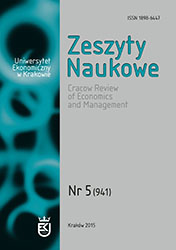The Problem of Zero Cells in the Analysis of Contingency Tables
The Problem of Zero Cells in the Analysis of Contingency Tables
Author(s): Justyna BrzezińskaSubject(s): Economy
Published by: Wydawnictwo Uniwersytetu Ekonomicznego w Krakowie
Keywords: zero cell; categorical data analysis; contingency tables; log-linear analysis
Summary/Abstract: Log-linear analysis is a statistical tool used to analyse the independence of categorical data in contingency tables. With this method, any number of nominal or ordinal variables can be analysed: interactions can be included in the model, various types of association can be analysed, and the analysis provides a formal model equation. Although log-linear analysis is a versatile statistical method, there are some limitations in using it due to zero cells. Zero cells in contingency table are of two types: fixed (structural) and sampling zeros. Fixed zeros occur when it is impossible to observe values for certain combinations of the variable. Sampling zeros are due to sampling variations and the relatively small size of the sample when compared with a large number of cells. In the paper several options will be presented for how to deal with zero cells in a table. All calculations will be conducted in R.
Journal: Zeszyty Naukowe Uniwersytetu Ekonomicznego w Krakowie
- Issue Year: 941/2015
- Issue No: 05
- Page Range: 49-61
- Page Count: 13

